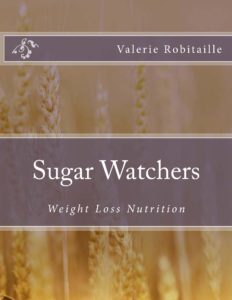The following is excerpted from the book Sugar Watchers: Weight Loss Nutrition, By Valerie Robitaille, PhD
AVAILABLE ON AMAZON (Click HERE)
Or EBOOK (Click HERE)
A DIET THAT IS 70% CARBOHYDRATES WILL LEAD TO FOOD CRAVINGS AND WEIGHT GAIN
My goal here is to provide you with a basic enough understanding of the insulin response, and how it keeps most individuals weighing more than they want to.
The Insulin Response
Once I tell you what I know you may then realize the reason you’ve not been successful at easy and lasting weight loss. I was 42 when I learned the principles I’m going to share with you. I was studying for my Master’s in Nutrition and had gone on my last fad diet. I battled weight issues all my life. I was bulimic (never anorexic), vegetarian, vegan, went on Atkin’s, Pritikin’s (and all the other kins). I joined gyms and churches, drank weird things and ate like a rabbit. I tried it all and felt defeated – until I learned about the insulin response which begins with:
How carbohydrates are digested into sugar, increase insulin and are converted to fats
For the purpose of simplicity, we are going to consider the actions of insulin as though it is the only hormone in your body telling your cells what to do. But remember – insulin, like all hormones, does not act alone; all the hormones of the body are connected, and they are helping each other regulate all the same biochemical reactions simultaneously.
Let us follow carbohydrates through your system to see how they affect insulin secretion. For this example, we are going to divide your body into two parts; inside and outside the body.
The intestinal tract is made up of your mouth, esophagus, stomach, small intestine, large intestine (colon) and rectum. It can be thought of as being outside your body since it is in contact with the outside at both ends. It is in the digestive tract from your mouth to your small intestines that the food you eat is digested (broken down) into its smallest possible building blocks.
When you digest carbohydrates, you break them down into sugar. Sugar is small enough that it can pass from the small intestines (outside the body), through the intestinal wall and into the blood system (inside the body). This process is called absorption; therefore, the purpose of digestion is absorption.
The area of the bloodstream where sugar enters is called the portal vein. Though its name is not important, it is important for you to know that the portal vein links your small intestines directly to your liver and not to any other organs or cells. This path is a one-way highway.
It is at the level of the portal vein that insulin is introduced into the bloodstream proportionate to the amount of incoming sugar. The insulin and sugar travel directly to the liver where the liver cells take up sugar from the bloodstream because insulin tells the liver cells to open up their doors – or receptors – and let the sugar in. Insulin does this for other cells of the body too, and the condition where insulin is no longer effective at this is known as insulin resistance.
In the picture below, notice the insulin, and consequently the glucose (sugar in the blood) are not making it to the receptor sites on the cells: When we eat, the pancreas puts out insulin. Eating carbohydrates causes the highest amount of insulin to be secreted. Insulin is a storage hormone. In graduate school we referred to it as the “fat” hormone because it helps store carbohydrates as fat (in case of future famine.) So basically, we are telling the body to store fat when we over-consume carbohydrates, particularly the refined type (bread, cereal, pasta and of course sugary foods – yes, even fruit). Metabolically, when you eat foods high in sugar and carbs, you increase both blood sugar and insulin levels. Insulin is a “hungry hormone” and responsible for increased fat storage to boot! It signals the body not to release any stored fat. So you can’t even use your own stored body fat for energy, it just stays where it’s stored.
When we eat, the pancreas puts out insulin. Eating carbohydrates causes the highest amount of insulin to be secreted. Insulin is a storage hormone. In graduate school we referred to it as the “fat” hormone because it helps store carbohydrates as fat (in case of future famine.) So basically, we are telling the body to store fat when we over-consume carbohydrates, particularly the refined type (bread, cereal, pasta and of course sugary foods – yes, even fruit). Metabolically, when you eat foods high in sugar and carbs, you increase both blood sugar and insulin levels. Insulin is a “hungry hormone” and responsible for increased fat storage to boot! It signals the body not to release any stored fat. So you can’t even use your own stored body fat for energy, it just stays where it’s stored.
INSULIN CONVERTS NEARLY HALF OF THE CARBOHYDRATES YOU EAT TO FAT FOR STORAGE
The solution is to start burning the fat you have already stored from too much carbohydrate by moderating your insulin response, and stop storing fat. Since insulin is a hormone, and hormones are a huge part of our body chemistry (they interact with each other all the time), the first thing we must do is straighten out our hormones, particularly insulin but we must also consider cortisol if there are any serious stress issues in our lives. This program will help you with hormonal balance as you go along and learn the signals your body is giving you.
To begin your journey of weight-loss and regaining your health, start to focus on high fiber carbohydrates like non-starchy vegetables for the majority of your carbohydrate intake. These will make you feel satisfied, are brimming with nutrients, and keep your bowels moving – very important part of feeling well. You should eliminate all refined, low fiber and processed carbohydrates as they have very little nutritional value and contribute to an unwanted insulin response. Once you eliminate these foods you will find your cravings for them diminish considerably. You will be in control.

How to lower insulin
- Cut carbohydrates (sugar and hidden sugar) and follow food and portions on page 44
- Avoid combining protein and sugar. This creates a big spike in insulin. For example, sweet and sour chicken
- Avoid lean low-fat proteins. Particularly dairy and meats. The proportion of protein to fat in these products cause insulin to spike
- Avoid eating protein to excess protein (converts to insulin)
- Avoid MSG – spikes insulin by 200%
- Don’t eat too frequent meals – this keeps insulin high all day
- Manage stress
- Watch video below for more information on how it is possible to end the cravings that so often throw us off our food plans:

